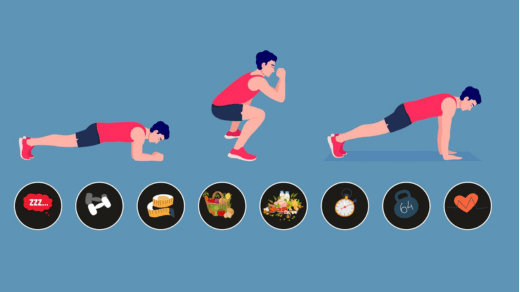
Introduction: Quality sleep is often underestimated in its impact on fitness and overall well-being. This guide explores 30 key points on the crucial role of sleep in your fitness journey, along with the pros and cons associated with each aspect, to help you understand the significance of restorative rest for your health and fitness goals.
- Physical Recovery:
- Pros: Sleep aids muscle repair and growth.
- Cons: Inadequate sleep hinders recovery.
- Mental Restoration:
- Pros: Improves cognitive function and focus.
- Cons: Sleep deprivation impairs mental clarity.
- Hormone Regulation:
- Pros: Sleep balances hormones essential for fitness.
- Cons: Poor sleep disrupts hormonal balance.
- Energy Levels:
- Pros: Rested sleep leads to higher workout energy.
- Cons: Sleep deprivation causes fatigue.
- Metabolism:
- Pros: Sleep supports a healthy metabolic rate.
- Cons: Lack of sleep can lead to weight gain.
- Appetite Control:
- Pros: Adequate sleep reduces cravings.
- Cons: Sleep deprivation increases hunger.
- Recovery Time:
- Pros: Sleep shortens post-workout recovery.
- Cons: Inadequate rest prolongs recovery.
- Mood and Motivation:
- Pros: Sleep enhances positive emotions.
- Cons: Sleep deprivation can lead to irritability.
- Immune System:
- Pros: Quality sleep bolsters immune function.
- Cons: Poor sleep weakens the immune system.
- Stress Reduction:
- Pros: Sleep lowers cortisol (stress hormone) levels.
- Cons: Stress may disrupt sleep patterns.
- Consistency in Sleep Schedule:
- Pros: Regular sleep patterns improve fitness performance.
- Cons: May require discipline to maintain.
- Sleep Duration:
- Pros: 7-9 hours is the recommended range for adults.
- Cons: Chronic oversleeping can also be problematic.
- Sleep Environment:
- Pros: A comfortable, dark room promotes quality sleep.
- Cons: Environmental factors can disrupt sleep.
- Limit Caffeine and Alcohol:
- Pros: Reduces sleep disturbances.
- Cons: Overconsumption affects sleep quality.
- Reduce Screen Time Before Bed:
- Pros: Promotes relaxation and better sleep.
- Cons: Challenging to break the habit.
- Regular Exercise:
- Pros: Exercise improves sleep quality.
- Cons: Late-night workouts may interfere with sleep.
- Bedtime Routine:
- Pros: Establishes cues for sleep.
- Cons: May require discipline and time.
- Mindfulness and Relaxation Techniques:
- Pros: Calms the mind for better sleep.
- Cons: Requires practice and consistency.
- Limit Liquid Intake Before Bed:
- Pros: Reduces nighttime awakenings.
- Cons: May lead to dehydration concerns.
- Sleep Tracking Apps:
- Pros: Provides insights into sleep patterns.
- Cons: Potential over-reliance on technology.
- Naps:
- Pros: Short naps boost alertness.
- Cons: Long naps can interfere with nighttime sleep.
- Melatonin Supplements:
- Pros: May help regulate sleep patterns.
- Cons: Should be used cautiously and under guidance.
- Shift Work Challenges:
- Pros: Strategies to mitigate sleep disruption.
- Cons: Adapting to shift work can be demanding.
- Respecting Sleep Needs:
- Pros: Prioritizing sleep for long-term health.
- Cons: Social and work obligations may conflict.
- Avoid Sleep Medications:
- Pros: Reduces reliance on sleep aids.
- Cons: Potential dependency and side effects.
- Rest Days and Sleep:
- Pros: Vital for recovery on non-workout days.
- Cons: May feel unproductive to some.
- Professional Guidance:
- Pros: Sleep specialists can diagnose and treat issues.
- Cons: Costs associated with consultations.
- Travel and Jet Lag:
- Pros: Strategies to minimize travel-related sleep disruption.
- Cons: Jet lag can be challenging to overcome.
- Social Jet Lag:
- Pros: Consistent sleep patterns, even on weekends.
- Cons: Social activities may interfere.
- Consistent Effort:
- Pros: Long-term benefits of prioritizing sleep.
- Cons: Requires ongoing commitment and lifestyle adjustments.
In conclusion, sleep is a non-negotiable element of your fitness journey. Prioritizing sleep and adopting healthy sleep habits can enhance your physical and mental performance, improve recovery, and support your overall health and fitness goals. While each point highlights the benefits of sleep, it’s important to recognize that sleep quality and needs can vary among individuals, and seeking professional guidance for sleep-related issues is advisable when necessary.




